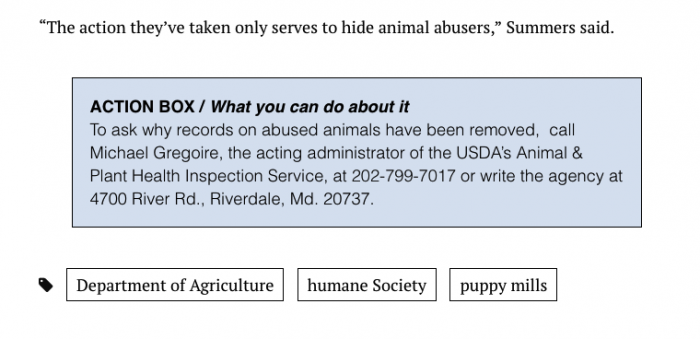
David Cay Johnston, the reporter that Donald Trump says “nobody has ever heard of,” suddenly came to a lot of people’s attention Tuesday, when he appeared on MSNBC’s Rachel Maddow Show to talk about Donald Trump’s 2005 Form 1040 tax returns, which had been leaked to him by someone with access. (Johnston hinted broadly that Trump himself might be a candidate for its origin.)
Johnston, a veteran reporter who won a Pulitzer Prize in 2001 for his reporting on loopholes in the U.S. tax code, wasn’t exactly laboring in obscurity before then, but his appearance certainly did help raise the raise the profile for DCReport, the small three-month-old nonprofit news site where he first published the Trump tax story — and which immediately crashed thanks to the flood of traffic it drew.
While the Trump story was a big early win for the site, it’s an outlier compared to the site’s bread-and-butter coverage so far, which has largely been focused on the minutiae of politics and policy rather than presidential scoops. That distinction is a core one, and one which DCReport hopes will both help it stand out in a crowded, noisy political news space and also help it serve readers in a way that most news organizations haven’t been able — or willing — to do so far.
“First and foremost, our goal here is to cover what the administration and Congress do, not what they tweet or say they’re going to do,” said Johnston in an interview last week, before the Trump story broke. This, he said, means getting in the weeds. An early DCReport story focused on an obscure rules tweak that would let Congress give away federal lands irrespective of its worth. “Nobody reported on this,” said Johnston. “I just thought that this was just a perfect example of how journalists are watching the debate and what politicians say, and they’re not covering what they do. And that’s what matters.”
That reporter “nobody ever heard of,” @DavidCayJ, is a Pulitzer Prize winner and one of the nation’s most respected journalists. So, yes. https://t.co/rwWnIxVFoa
— David Boardman (@dlboardman) March 15, 2017
Just as important to that approach is reporting on those changes early enough so that readers can do something to prevent them. One of the site’s core features is what it’s calling an “Action Box,” which offers links to official proceedings, contact information for relevant politicians, and other information.

A February story about the Department of Agriculture’s decision to stop publishing its list of dog breeders with animal rights violations includes the phone number and office address of Michael Gregoire, the acting administrator of the USDA’s Animal & Plant Health Inspection Service. In situations where there are no official proceedings on the table, DCReport links to relevant profiles on Twitter and Facebook. as it did in a recent story about an Environmental Protection Agency directive that would let oil, gas, and coal companies release methane into the air without keeping records of it. While the site doesn’t make specific policy prescriptions, it is focused on keeping readers informed on what’s coming and how they can get involved.
The notion that news organizations can do more to empower readers to affect political change is an uncomfortable idea for many reporters, who might consider it in conflict with journalistic norms of neutrality, Johnston said. “The approach for most is to stand back and be apart from all of this stuff. And I just don’t agree with that,” says Johnston, who argues that this approach often makes the information “useless” to readers. “That’s one of the reasons people have turned away from newspapers. They’re full of richly reported, detailed, and useless information. We want people to reacquire a sense that this is their government.” (The site makes a conscious effort to use that sort of language — “our government” or “your government” — in stories.)
David Crook, the site’s managing editor, said that this “citizen-focused” approach to coverage reflects the reality that, while “no one cares what goes on in a [legislative] markup session, that’s where so much governance actually happens,” he said.
DCReport has focused this approach on a handful of key areas where the new administration and Congress have been particularly keen on enacting (or retracting) legislation or regulation. The changes at the Environmental Protection Agency, whose head Scott Pruitt rejects the scientific consensus on climate change, is a major target of its coverage. The site is also, like many outlets, focused on the ongoing healthcare story. Other core topics include immigration, civil rights, regulation, taxes, and manufacturing.
While DCReport would like to get to the point where it can hire roughly 30 full-time reporters on a $4 million budget, it’s still a small operation of 4 full-time people so far. The site is looking to raise as much as $3 million this year from foundations, major donors, and individual readers to make that happen. The site will never run advertising; Johnston is currently “working pro bono — no salary until we raise enough money to do the kind of job needed to make Washington truly accountable to the people.”
Johnston said that, ultimately, the site’s goal is to help strengthen the connection that its readers have with the government by drawing a straight line between the issues it reports on and the tactics available to readers to change them — a connection that often feels lost for many people. “One of the biggest and most important, but unreported stories, in this country is the extent to which our democracy is in trouble because people feel that the federal government is alien to them, that they don’t have any power or influence over it,” said Johnston. “From the moment I started thinking about this, I knew we wanted to show people how to make the government more responsive to their needs. We’re going to empower people.”